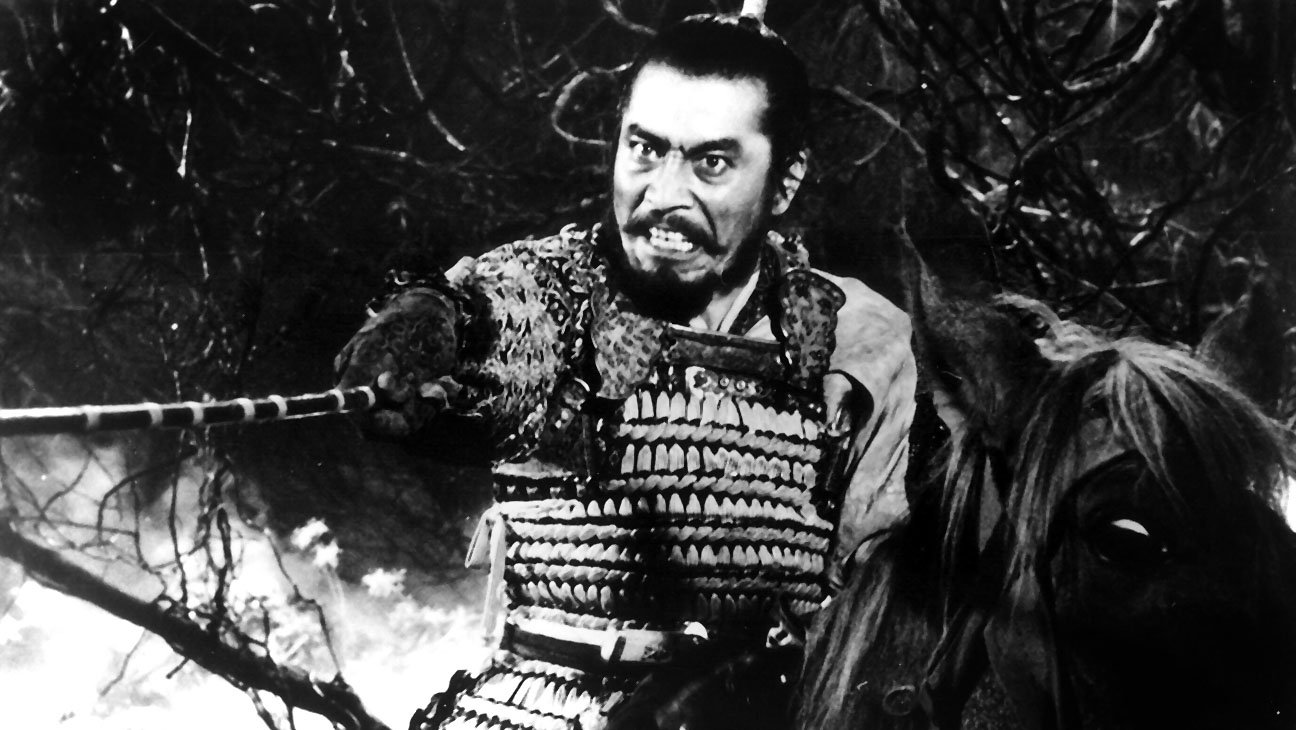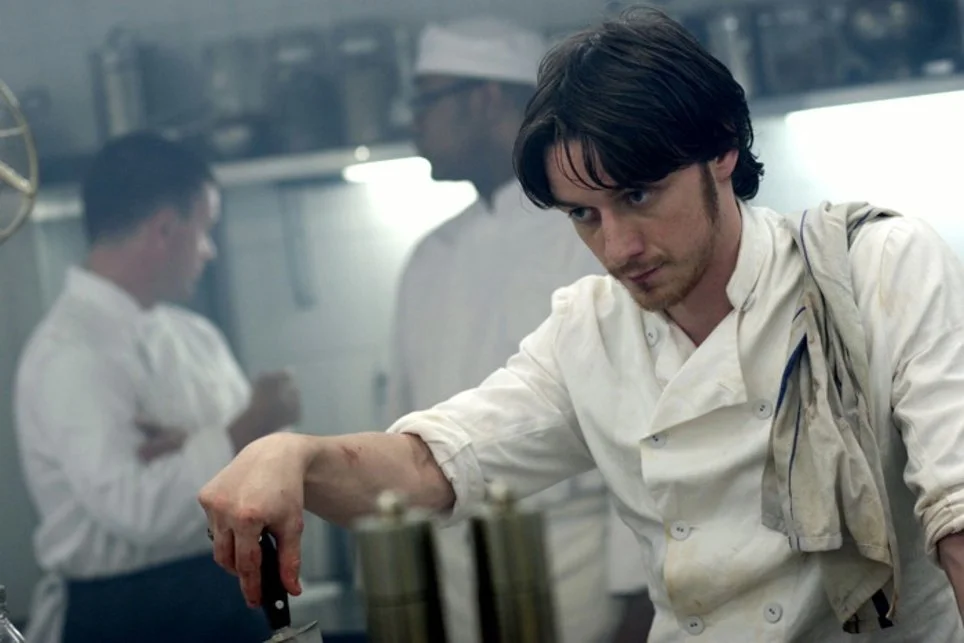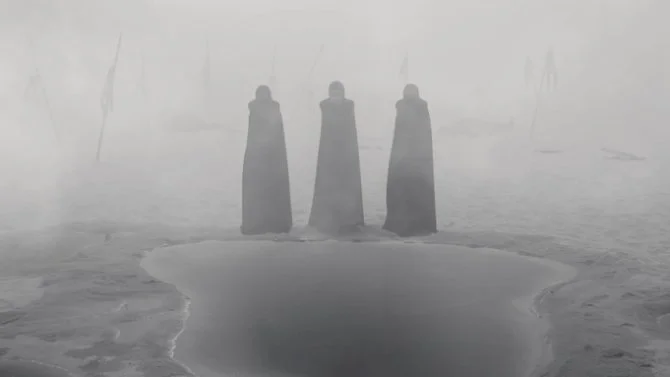Their "hour upon the stage" – the best and worst of 5 versions of MACBETH on screen
by Fiona Underhill, Contributor
With Joel Coen’s new adaptation of Macbeth coming to theaters on Christmas Day (and Apple TV+ on January 14), I’ve taken a look at some previous adaptations (and taken a look at the new one too) and I’m here to take you through their strengths and weaknesses.
The Scottish play needs a strong Macbeth and Lady Macbeth, of course, but the supporting players are just as vital. We’re also all on the lookout for how an adaptation is going to interpret certain elements, lines or scenes from the original Shakes play and all five of these have very different versions of the witches, Banquo’s ghost and of Birnam Wood coming to Dunsinane - which is fascinating.
All of these are obviously my personal opinions on what works and what doesn’t for me!
1.Throne of Blood (dir. Akira Kurosawa, 1957) – available on Criterion Channel
Weaknesses: the film opens and closes with what sounds like a child practicing the recorder (which is painful to the ears). Mifune (who I’ve enjoyed in many Kurosawa films, especially the noirs) is very one-note throughout as Washizu (the Macbeth equivalent) and never varies his facial expression or temperament. I can see the influence of Noh theatre, obviously and theatricality is no bad thing, but the central performance needed more variety.
Strengths: transposing the story to the feudal Japanese setting works really well. Both The Spirit of Spider’s Web (standing in for the witches) and Banquo’s ghost are great – really well done. Isuzu Yamada’s performance (as the Lady Macbeth equivalent) works better, as hers is more of a blank-faced stillness, which makes her more sinister and more aligned with the spirit. It is an interesting choice for her to become pregnant during the course of the film and deliver a stillborn child. The mistiness throughout and especially in the Birnam Wood moment works very well. The ending, in which Washizu’s troops turn on him and fire a relentless tirade of arrows into him from the ground, as he stands on a battlement, is FANTASTIC.
2. Macbeth (dir. Roman Polanski, 1971) – available on VOD
Weaknesses: the use of voiceover for the soliloquies does not work and a bear gets tormented by barking dogs, which is difficult to watch. Macduff does not make much of an impression – he needs to make more of an impact in his short screentime. This also has terrible music at the end, but not as bad as the shrieking recorder.
Strengths: it starts with the witches, as all good Macbeth adaptations should. They are three different ages, with the oldest being a blind crone. The battlefield is windy, rainy and it looks like it was utterly miserable to film in these conditions (and is therefore has authentically Scottish weather) – the Coen one is way too clean. Francesca Annis is a great Lady Macbeth, her persuasive speech happens at the party after Duncan’s arrival, as they are surrounded by people, which makes her seem even bolder. Duncan wakes up and sees Macbeth during the murder scene and even says his name, which definitely makes it worse (and therefore better). The coven of naked witches is a wonderful scene and the part that every teacher tries to rapidly fast-forward when showing this to a class. The slaughter of the Macduff’s wife, children and servants is very good – brutal, harsh, violent – a truly unforgivable act. There’s a nice use of a rising sun in the Birnam Wood scene, but it’s otherwise pretty straightforward.
3. ShakespeaRe-Told: Macbeth (dirs. Peter Moffat and Mark Brozel, 2005) - available on VOD
Weaknesses: this is one of the most achingly mid-2000s things ever. The restaurant décor, the bemusing Matrix-inspired fashion choices…it’s incredibly dated is what I’m saying.
Strengths: transposing Macbeth to the hierarchy of the kitchen of a Michelin-starred restaurant is inspired. This one also starts with the witches, who are three garbage men and one of them is The Green Knight himself – Ralph Ineson! (Joe) Macbeth is played by an actual Scottish actor – James McAvoy – which is a huge bonus in my eyes. Keeley Hawes plays a fantastic Lady (Ella) Macbeth.
There is a great meta joke about Gordon Ramsay. This one, crucially, gives Macbeth credible motivation to hate Duncan – something lacking in many adaptations and you could argue, the original play. We need to be convinced by Macbeth’s transition from loyal soldier to the decision to commit regicide and simply being horny for Lady Macbeth is not always enough! The “Birnam Wood” moment is, honestly, genius – “no harm will come to Macbeth until pigs can fly” and then the cops arrive in a helicopter.
4. Macbeth (dir. Justin Kurzel, 2015) –available on HBO Max
Weaknesses: unfortunately, a really important component – the witches – aren’t great. They have a young girl and a babe-in-arms with them, which could have added an extra dimension, but their performances and the blocking of their scenes isn’t very interesting. The choice to burn the Macduff family in front of a crowd doesn’t really work, although it does make sense as to why Lady Macbeth falls apart after this. There’s no porter scene – boo.
Strengths: THE ADAM ARKAPAW CINEMATOGRAPHY! THE JED KURZEL SCORE! Michael Fassbender and Marion Cotillard are both excellent and not for nothing, exactly the right ages for the characters, in my humble opinion. This one does have an interesting opening - the funeral of the Macbeths’ baby.
Paddy Considine is absolutely perfect casting for Banquo – he breaks my heart before he says or does anything. There is a good attempt at Scottish accents from everyone and some Gaelic singing. You see Macbeth with his men in the early scenes (which also have the requisite wind and rain) and understand their loyalty – how much they go along with and how much they turn a blind eye to later on. David Thewlis as Duncan! Sean Harris as Macduff! The cast across the board are so good. The “Tomorrow, Tomorrow speech” is very well done - Macbeth picks up Lady Macbeth’s corpse and half dances with it, half drags it across the floor. Almost every adaptation does Birnam Wood coming towards Dunsinane in really clever, inventive ways. In this case – fire, which blows ash/embers etc (made from the wood) towards the castle.
5. The Tragedy of Macbeth (Joel Coen, 2021) – In theaters Christmas Day, streaming on Apple TV+ January 14
Weaknesses: over all, this adaptation is very cold and doesn’t make me feel anything (apart from one scene). Washington and McDormand are far too old for the characters - their motivations make little sense at this age. I’m afraid that the clash of American and British RP accents is quite grating, as is the contrast of Hollywood smiles vs British teeth. We aren’t given enough to get from the A to B to C of Macbeth seemingly loving and respecting Duncan, to regicide, to the mass slaughter etc. Banquo (Bertie Carvel) has the most baffling and distracting eyebrows that I’ve ever seen in my life.
Strengths: the cinematography and theatricality are stunning, it is clear that all of the locations, including the exteriors are sets and this works well, especially in relation to “a poor player, that struts and frets his hour upon the stage, and then is heard no more.” The Birnam Wood scene also works well in this hyperreal setting. Good costuming, but both they and the sets are so clean and perfect, the audience is kept at a remove. Ralph Ineson is also in this one! Ross (Alex Hassell) is very interesting in this version – his role is expanded and he becomes almost an extension of the witches. Speaking of the witches, this version has the best witches of all! KATHRYN HUNTER plays all three (and if there is any justice, she will be Oscar-nominated). I’m fortunate enough to have seen Hunter doing physical theatre on stage and it’s a sight to behold. It’s an absolute delight to see her here and I only wish that the rest of the film could be as playful and inventive as her scenes. Stephen Root as the porter is also brilliant casting. Almost equally as good as Hunter is Corey Hawkins in the role of Macduff (again, who would be so worthy of an Oscar nomination). His is the only performance that elicited any emotion from me – “all my pretty ones, all my pretty chickens?” is a line that should be absolutely heart-wrenching, and that is very much the case here.
So, there you have my Macbeth adaption opinions – told by an idiot, full of sound and fury… signifying nothing.





